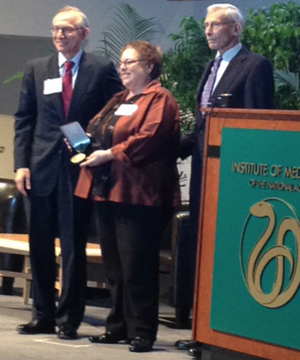Professor R. Alta Charo has been honored for her outstanding service to the Institute of Medicine of the National Academies.

R. Alta Charo receiving the Adam Yarmolinsky Medal
Charo received the Adam Yarmolinsky Medal, an award given to a non-physician member who has made extensive contributions to IOM, through service on its boards, committees and forums.
“I was completely surprised, and thrilled,” Charo says. “Service on IOM and other National Academies boards and committees has been one of the highlights of my professional life.”
Charo currently chairs a workshop that helps guide patients to responsible and safe stem cell therapy trials. Previously, she co-chaired the Human Embryonic Stem Cell Research Advisory Committee, whose guidelines influenced governmental regulations, universities and professional societies.
She also contributed to “The Future of Drug Safety,” a book published by the Committee on the Assessment of the U.S. Drug Safety System in 2007. The committee’s recommendations helped shape federal legislation and improved the drug approval process and the surveillance of marketed drugs.
But one of Charo’s most memorable duties with IOM involved an ethics review of a pivotal trial of a method to prevent mother-to-child transmission of HIV in Uganda — a small study with big impact. “The trial was attacked by some as exploitative, but as a result of our committee’s review, a crucial and effective intervention continued. I would like to think there are children alive and healthy today in part due to our work on that study,” she says.
Charo is the Warren P. Knowles Professor of Law and Bioethics at the University of Wisconsin-Madison, where she is on the faculty of the Law School and the Department of Medical History & Bioethics at the School of Medicine and Public Health.
“I am incredibly grateful to the state of Wisconsin for having built a university so excellent in its academics and its commitment to public service,” she says. “Without that, I wouldn't have had the benefit of being educated by my colleagues across the campus, nor the time to transform that education into a service for others.”
Submitted by Kelsey Gusho on October 30, 2013
This article appears in the categories: Articles